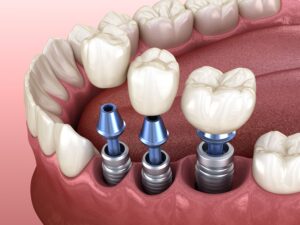
Tooth loss can impact your daily quality of life because it’s harder to chew food or converse with family and friends without teeth. Dentures are the tried-and-true method for refurbishing your smile because they restore so much of your ability to eat and speak. That doesn’t mean they’re the right solution for everyone, though. If you’re having challenges keeping your dentures in place or remembering to remove them at night, you might do better with dental implants.
This is often considered the most reliable method for replacing lost teeth and provides many unique benefits. Making the switch can be quite an adjustment, though. If you’re considering this change, keep reading to learn more about what to expect!
Why Should I Upgrade to Dental Implants?
Many patients opt for dentures because they think it’ll be more convenient and cost-effective only to become annoyed with them later. You might grow frustrated with them becoming dislodged or are tired of the hassle of cleaning them after every meal and remembering to soak them at night. Dental implants, meanwhile, include a titanium rod that’s embedded into your jawbone which makes them incredibly sturdy. You’ll no longer need to worry about slipping or clicking restorations. Plus, caring for them is as simple as brushing and flossing twice daily.
Do I Need a Bone Graft First?
It’s important to note that you may need to undergo additional procedures to be a good candidate for dental implants. This is because your jawbone starts to deteriorate after teeth fall out. Your body reabsorbs the bone density that’s no longer required to support absent pearly whites. This causes the structure of your mouth and face to shift, which likely contributed to your loose dentures. If your jawbone is too weak to support dental implants, a bone graft may be required to add bulk. Then, it takes about 4 to 6 months for your mouth to heal sufficiently so you can move forward.
What’s Involved in Dental Implant Placement?
Once you have the bone mass necessary to support dental implants, your dentist will schedule your surgery to place the appropriate number of titanium rods needed. If you’re getting implant-supported dentures, you can expect 4 to 6 of these in each arch. These eventually fuse with your jawbone through a process called osseointegration that can take 3 to 6 months. Once you’ve recovered, your dentist will call you back to attach your implant dentures or dental crowns, depending on your circumstances.
When it’s all said and done, you’ll have a newly restored smile that is easier to care for and will last for years to come!
About the Author
Dr. Jeff Lee attended dental school at The Ohio State University College of Dentistry which he followed with a 4 years residency in Oral and Maxillofacial Surgery at The Ohio State University Wexner Medical Center. After several years working in the United States Navy, he then obtained a Master of Science degree in the area of dental implants. That makes him an expert who can help you rebuild your smile regardless of your dental condition. If you’d like to upgrade from dentures to dental implants, you’re welcome to request a consultation on the website or by calling (740) 236-9392.
